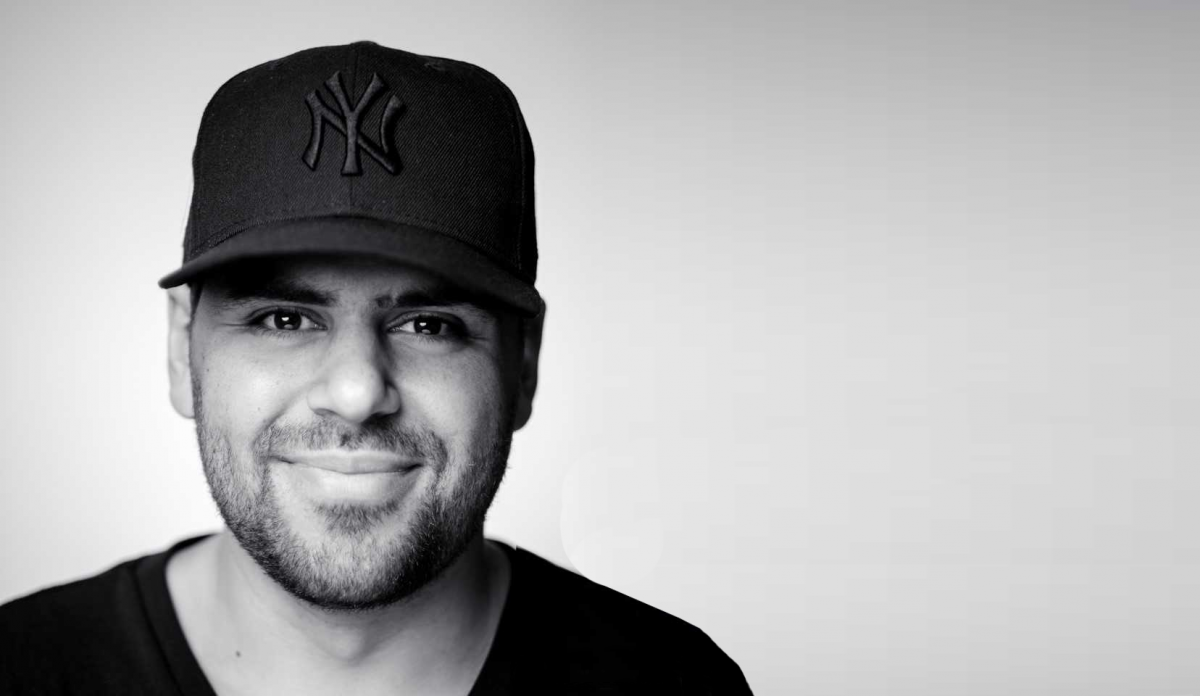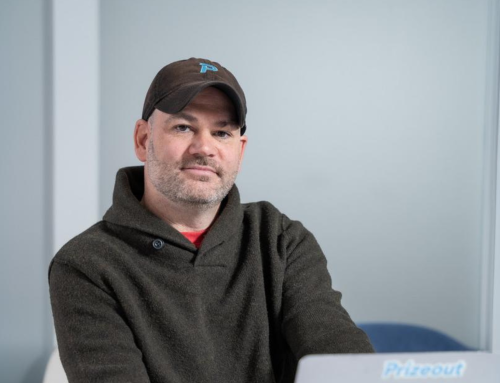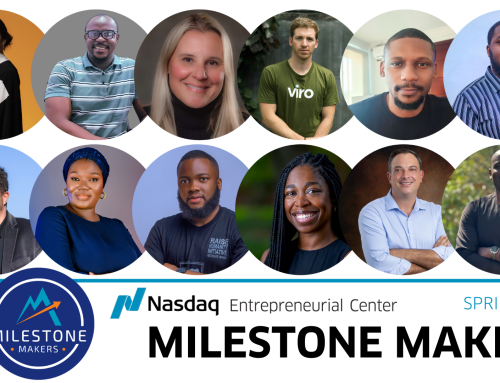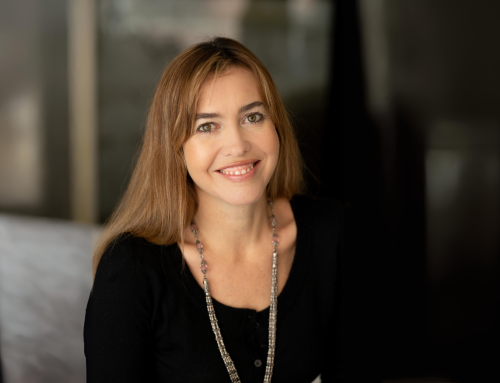Thomas McLeod is Founder and CEO of Omni, the on-demand personal storage concierge based in San Francisco. The startup was inspired after a year spent dealing with the friction of a classic storage-unit month to month membership—McLeod set out to create a storage solution with a share-economy model. The Nasdaq Entrepreneurial Center sat down with McLeod to learn more about his journey as an entrepreneur so far.
So what does “entrepreneurship” mean to you?
TM: A key part of entrepreneurship to me is believing in something so much that you’re willing to risk other opportunities in the pursuit of it.
How did Omni as a company come to be?
TM: The decision to pivot to Omni was mentally gradual – it started as a UI in my head in 2012, about a year after I moved to San Francisco. My wife and I rented a storage unit the same day we moved into our apartment. After a year paying however much and no longer having any clear idea of what was in the storage unit (and no longer having a car to go look), the itemized storage idea started rattling around my brain and grew from there. I got really excited thinking about all the potential avenues there were for people’s things to provide more value, and ultimately decided to start Omni for three reasons:
- I wanted to take a big swing. I didn’t want to be a “serial entrepreneur” that dabbled in small stakes.
- I wanted to create something that could operate anywhere (be well-staffed with a specific type of workforce), but also bring real value to consumers anywhere.
- I wanted to try and scale a company culture that would transcend the workplace. I think what I mean is that I (still) want to create the best company to be a part of, but also a company that has a meaningful, positive impact on the world.
What’s the biggest lesson learned on your journey so far?
TM: The most significant lesson has been learning how to staff smartly — specifically who to hire and when. When getting off the ground, the momentum can make everything feel so urgent that it’s incredibly tempting to hire for all the roles you think you’ll need, but this can be a costly mistake. A few well-rounded generalists can go the distance and deliver more value out of the gate than the world-class specialists you’ll eventually need to hire. Generalists help you define what you need, identifying what areas of the business require focused expertise soonest, and who to hire to deliver it.
How is your company changing the landscape?
TM: Omni is redefining peoples’ concept of ownership, and ultimately how we gain access to items of value and how we define value. Further, Omni is also the realization of the sharing economy, the vision for which hadn’t yet been tenably realized — mostly for reasons having to do with inconvenience and impossibly tiny margins. Omni has eliminated those obstacles. The sharing economy hasn’t ever been attractive to retailers (whose entire business is to make us buy more things), so it’s very much my hope that Omni might be a forcing function for change there – an economy built around planned obsolescence isn’t physically sustainable in a world of limited resources.

What do you wish you knew when you started? Is there anything you would do differently?
TM: I always knew Omni was going to be a challenging business, but I didn’t appreciate the breadth and different dimensions of “challenging.” Omni’s not a hard business because what we’re attempting to ultimately do is difficult; it’s hard because every distinct part of the business has unique complications. From the consumer experience and the way it’s reflected in our operational processes, to the internal systems and taxonomies of our facilities, to asking people to give their belongings to a stranger (who’s going to drive them away in a van), to the way we communicate and curate trust through that entire chain. No one thing makes Omni a hard business to run; the whole thing is layered.
In the beginning, I thought we could move different pieces at a time — as in, rein in the tech product, and then catch up on ops; after getting better on ops, then catch-up on the product, etc. But in reality, we have to raise the tide – whole thing, at once, to succeed. That wasn’t something I fully understood and still learn from every day.
What credo do you live by as you grow the business?
TM: People build businesses. You lead people – That’s what I run under right now. As a business scales, you realize pretty quickly that over time, you’ll become less relevant to the actual execution side of the business. But it remains hugely important to continually define what success is, visualize that regularly, and to do what it takes to make sure that’s direction the business is heading. Your role is to keep the team on that path and give them whatever they need to stay there. That’s something that continuously needs work because it changes every day with every new person, every new employee, and every new customer. You as the CEO/founder/entrepreneur have to be very open and willing to change.
It’s more difficult than it sounds: The other side is that when you have such a clear vision of why you started something, it becomes challenging to let go of all of the strings. You also have to realize that you won’t succeed if you don’t loosen up on them.
What advice do you have for fellow entrepreneurs about building and leading teams?
TM: You want to work with people that inspire you every day because that’s what will get you motivated to keep doing the work you have to do.
There’s no doubt that working with people who are going to challenge and push you – and by proxy inspire you – make the journey and effort worthwhile. It also instills a sense of growth and possibility from the top down. Be open with the fact that you’re expecting to learn from each person you’ve hired as much as you’re hoping to provide them with value, resources, and knowledge as they learn and grow in their roles. That’s a partnership I think you have to establish in the interview.
I want to hire someone who’s got big energy, a thought process that delivers results, and an evident desire to work for the company rather than someone with an impressive resume who doesn’t communicate a sense of drive. If someone’s enthusiasm and work are motivating to you, then it’ll be exciting to the whole team. That to me is how you win. People build companies.
Where do you find inspiration when faced with challenges?
TM: When I’m working on a challenge, I find that I need to switch my brain’s focus to something else and let my thoughts marinate in the background. Sometimes I sneak out in the middle of the day and go to a movie by myself, and I find that the two-hour break gives me the mental space I need to gather my thoughts in the background, and then I’ll get back to work. Just pounding against the same thing over and over does not lead to success, at least for me personally.
What does “success” look like for you? What do you think will help you achieve it?
TM: I define success as creating stability and upward momentum for my family and friends. Work to me is a means to an end, and the end game is more opportunity for longevity, health, entertainment, enjoyment and better experiences for those around me. That includes everyone who’s on the journey with me work-wise (team members, co-workers, etc.) who I’ve co-opted into helping me build the dream. So, I’ll consider it a success when I can say we checked those boxes, and that’s the lens through which I view the value of the work.
What is your proudest and darkest moment so far? Share a key high and a key low from your journey if you can.
TM: I was unbelievably proud when we launched the rentals feature in Omni. Our original game plan was for storage to be the Trojan horse that would build out into a marketplace. It took longer than I initially expected to get there, but over time, we threaded the needle and executed on everything we said we were going to do. I feel good when I do what I say I’m going to do, and I feel even better when Omni executes on what it says it’s going to do. That was a high, just knowing that we made it to this next, significant milestone.
We had a string of operational challenges that I’d count as a low. We weren’t fulfilling the expectations of our customers in a way that reflected the effort and energy of the team building the company, and it took a lot to dig our way out of that. We were in that for months. But in hindsight, I recognize it was something we needed to go through. It made us better in the long term. Having come through to the other side of it, I’m glad we had those lows early when we could still build the learnings it into the culture - a culture of bending not breaking. Resilience is now part of the ethos.
What lesson did 2017 have for you? What do you look forward to in 2018?
TM: 2017 taught me that being an effective CEO requires evolution. There were numerous times during 2017 that I questioned my abilities, and if I deserved to be a CEO. I learned that I need to continue to invest in myself to evolve and be the leader my company needs and deserves, and doing so has helped me reconcile a lot of those internal conflicts. What I’m most excited about in 2018 is to accelerate as a fully realized company, not just a skeletal system built around the idea of what our company could be. 2017 was about figuring out what Omni is, and 2018 is doubling down on that.
Many entrepreneurs continue to perfect their daily routines to support their work and greater vision; would you mind sharing your morning routine or a regular ritual that grounds your work each day?
TM: I play basketball almost three times a week at 7 a.m. I think of it this way: If you play well, and you have good games, and you win, then you want to keep the wins rolling. And the flip is if you don’t win, and you’re coming off of a bunch of losses, you know that you’re fired up to go and turn those losses into wins for the rest of the day. So for me, I come out of it motivated either way.
What kind of an entrepreneur do you want to be known as, as in, what do you want your legacy to be?
TM: I want to be known as someone who cared as much about the people as the product — from the people who work and build the company with me, to the people who use our service, to the people that I haven’t even met yet who support the idea and the vision. I want them to know that I was a people-first leader, and every time I had the opportunity to choose people or profit, I doubled down on the people, and that’s what led to success. We found better results and better opportunity and overcame our challenges because we doubled down on each other and the people who support us. Our value is in the people we interact with, and I want people to remember me for that.




Invite a Friend
Close